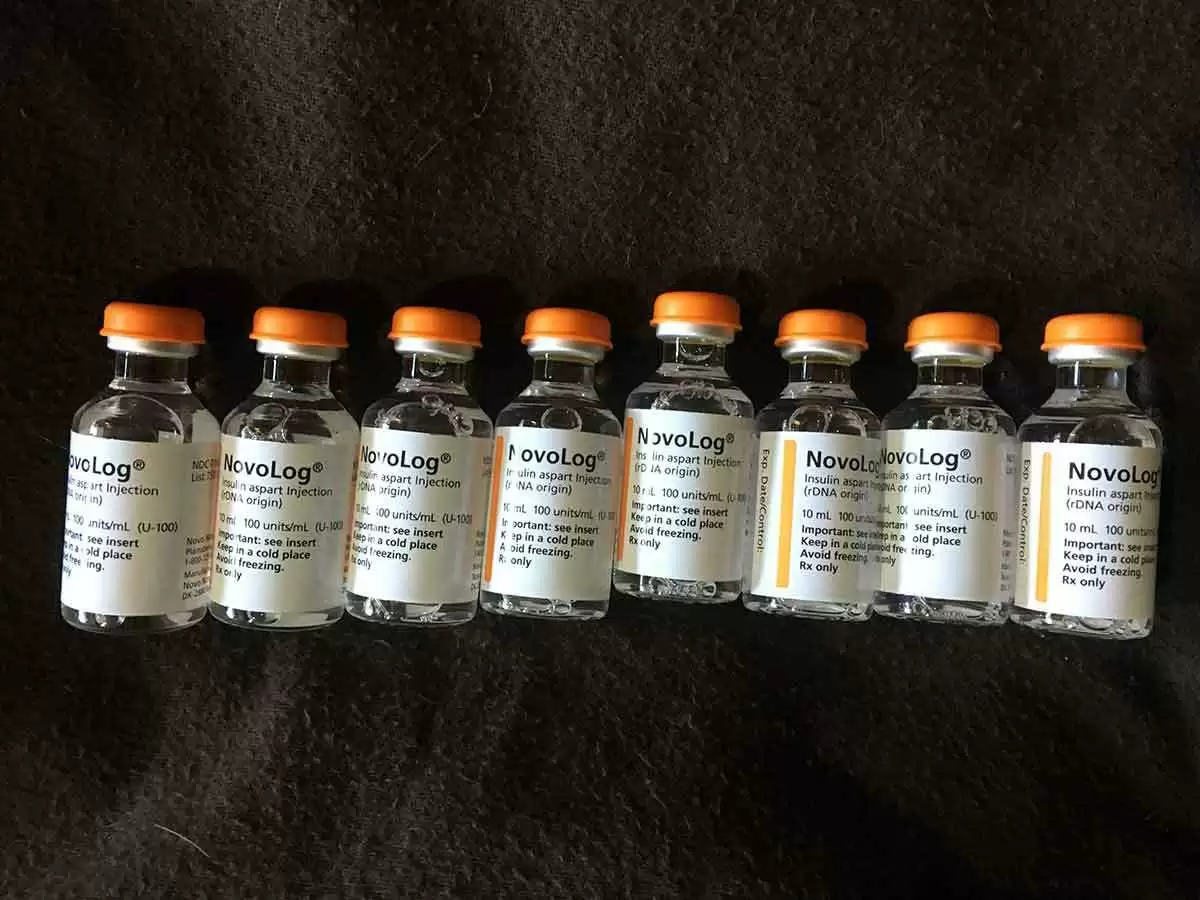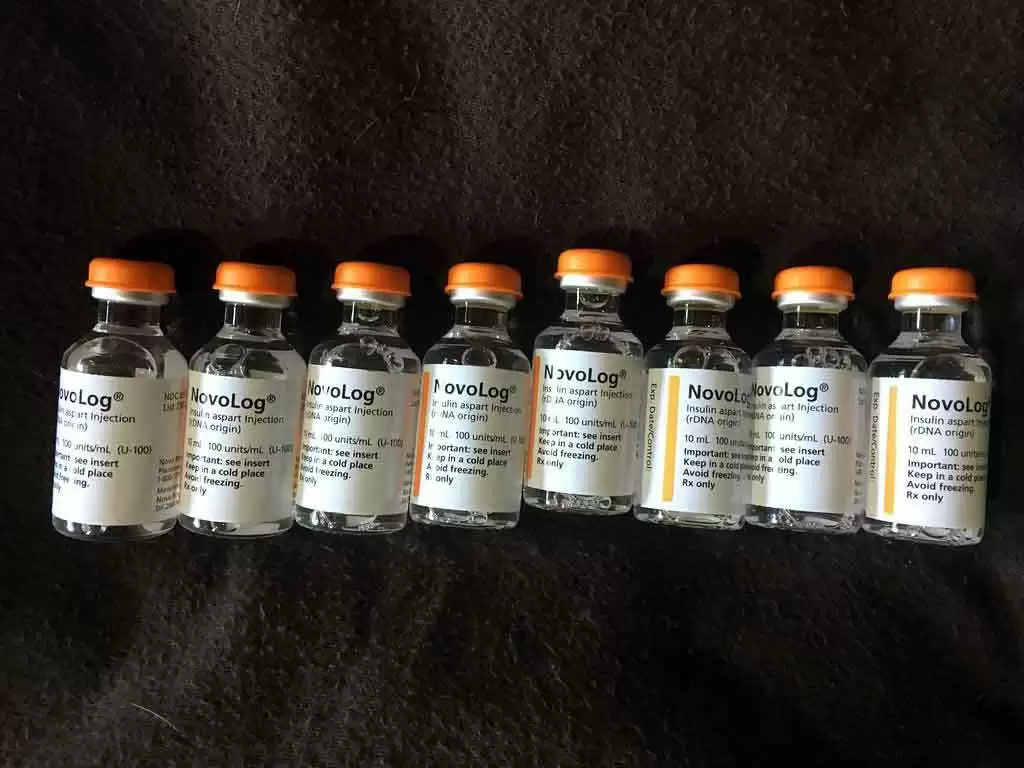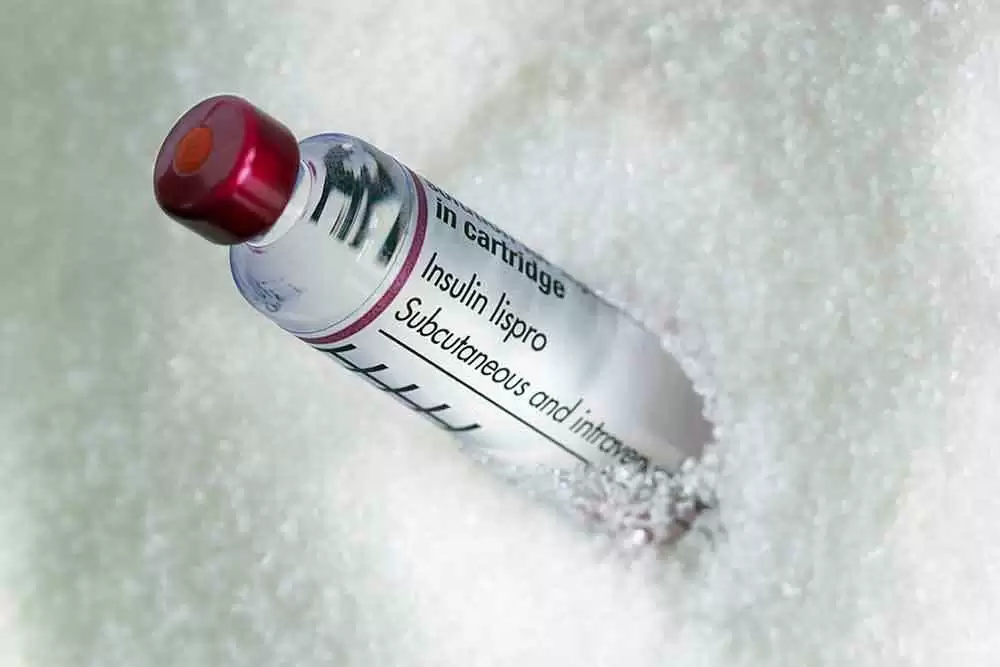-
Welcome to Celiac.com!
You have found your celiac tribe! Join us and ask questions in our forum, share your story, and connect with others.
-
Celiac.com Sponsor (A1):
Celiac.com Sponsor (A1-M):
-
Get Celiac.com Updates:Support Celiac.com!
Search the Community
Showing results for tags 'type 1 diabetes'.
-
Celiac.com 01/25/2023 - Studies that have tried to measure the effects of a gluten-free diet on the clinical, biochemical and psychological condition of youths with both type 1 diabetes and celiac disease have delivered mixed results. A team of researchers recently set out to evaluate the impact of gluten-free diet on growth, metabolic control and quality of life in children and adolescents with type 1 diabetes and celiac disease. The research team included Enza Mozzillo, Roberto Franceschi, Francesca Di Candia, Francesco Maria Rosanio, Letizia Leonardi, Ludovica Fedi, Valentina Rosà, Vittoria Cauvin, Adriana Franzese, and M. Loredana Marcovecchio. They are variously affiliated with theDepartment of Translational Medical Science, Section of Pediatrics, Regional Center of Pediatric Diabetes, Federico II University of Naples, Naples, Italy; the Department of Pediatrics, S. Chiara Hospital in Trento, Italy; the Pediatric Diabetology Unit, Pediatric Department, S. Chiara General Hospital inTrento, Italy; and the Department of Paediatrics, University of Cambridge and Cambridge University Hospitals NHS Foundation Trust, Cambridge, UK. The team first performed a systematic search of studies published in the last 15 years. They used PICOS framework to inform the selection process, and assessed evidence using the GRADE system. Their systematic review included only studies of moderate-high evidence quality level and reporting data on objectively assessed adherence to a gluten-free diet. Their findings highlight pre-adult adherence to a gluten-free diet in youth with type 1 diabetes and celiac disease leads to regular growth, stable BMI, without any negative effect on HbA1c and insulin requirements. Their main finding was that patients who followed a gluten-free diet experienced regular growth without any adverse increase in BMI. Moreover, the gluten-free diet does not negatively affect HbA1c and insulin, but is associated with higher post-meal glucose levels. Evidence from several studies indicate that a gluten-free diet is associated with better lipid profile and major quality of life and the psychological condition of juveniles with both type 1 diabetes and celiac disease. This study offers strong evidence that a gluten-free diet offers major benefits to juveniles with both type 1 diabetes and celiac disease. Read more at Diabetes Research and Clinical Practice.
-
- celiac disease
- diabetes
- (and 8 more)
-
Celiac.com 01/07/2023 - First reported in 1925, the coexistence of diabetes mellitus and celiac disease is not a new phenomenon. However, as late as 1984, the connection was viewed with skepticism. Prior to the use of intestinal biopsies, some researchers reported an increase of diabetes mellitus among family members of celiac patients, while others reported contradictory findings. After development of techniques for taking jejunal biopsies, modestly increased rates of diabetes were reported. These numbers were usually close to 1% of the celiac patients who were reported as having both diseases. When faced with these increased numbers of diabetes mellitus among celiac families and celiac patients, many asserted that certain genetically determined features of the immune system (HLA) were common among people with either condition. Such genetic factors, they argued, might predispose to autoimmune diseases in general, and would therefore be likely to increase the frequency of both conditions within the same families, and sometimes, within the same individual. The issue was further confounded by the overlap between classical symptoms of celiac disease and diabetes mellitus. Thus, a second diagnosis was often overlooked because all symptoms were considered to result from the first condition diagnosed. The reported rates of coexistence thus underrepresented the true overlap. It was only through systematic research among large numbers of diabetic patients who were biopsied, along with the development and use of serological testing for celiac disease, that the increased coexistence of these diseases gained recognition during the mid to late 1980s. Still, the dominant view ascribed a common origin for both autoimmune conditions. Thus, when other autoimmune diseases were recognized as overly common among celiac patients, little thought was given to the notion that gluten might trigger more than celiac disease. Several startling research findings threatened this perspective and offered a new window through which to view celiac disease and autoimmunity in general. Although this work was initially paid little attention, each of several distinct areas of research were building toward a critical mass. Exploration of intestinal permeability, and its relationship to celiac disease, was investigated throughout the 1990s. This work not only provided convincing evidence for the use of sugar absorption tests to screen for celiac disease in developing nations, it also established that intestinal leakage of food proteins is a consistent feature of active celiac disease. One spin-off result of this work was to increase the credibility of molecular mimicry as a dynamic that followed the leakage of food proteins into the bloodstream. These foreign proteins were shown to cause immune system reactions that damaged both the foreign proteins and self tissues with similar protein structures. Meanwhile, another area of research was increasing the use of serum antibody testing, called celiac panels, which soon revealed that celiac disease was dramatically more common than previously believed. These tests also established that the coexistence of celiac disease and diabetes mellitus was also common. When diabetic patients were tested, about 5% were shown to have celiac disease. When celiac patients were tested, about 10% were found to have diabetes mellitus. Developments in similar serum antibody testing, related other autoimmune diseases, also revealed that compliance with a gluten-free diet, following diagnosis of celiac disease, actually resulted in reductions of these other antibodies. These studies suggested that gluten might actually play a causal role, not only in diabetes, but in a wide range of autoimmune diseases that were previously considered to be coincidentally associated with celiac disease. Hope dawned for many who suffered from a wide range of autoimmune diseases . Simple dietary changes might aid new treatments and bring relief to these many sufferers of autoimmunity. Even in cases where gluten is not the underlying cause, we are gaining understanding of the dynamics by which autoimmunity develops. The crowning moment, with respect to diabetes, came in January of this year when A.J. MacFarlane, et al. published their findings in the Journal of Biological Chemistry. Their work demonstrated that wheat proteins might be a major causal factor in at least some cases of diabetes mellitus. Rooted in prior animal research that was largely spearheaded by Fraser Scott, this most recent research identified immune reactions, in diabetic humans, against wheat proteins which were also closely linked with the attack on the islet cells of the pancreas. This is an exciting moment for those with type 1 diabetes. Many of them may be aided in the maintenance of islet cell transplants (another new development) through following a gluten-free diet. This work also provides a potential turning point for everyone who suffers from autoimmunity. Thanks to the recent establishment of celiac disease as very common in North America, we now know that about 1 in 133 Americans have celiac disease. We also know that this common condition is triggered by gluten. This family of grain proteins also appears to cause some, perhaps many, cases of diabetes mellitus. The evidence against gluten is also growing in the investigation of other autoimmune conditions. It appears that celiac disease will soon be the window through which we will gain a better understanding of autoimmunity, and the gluten-free diet may be the cornerstone of the treatment of many cases of autoimmune diseases.
-
- celiac disease
- diabetes
-
(and 3 more)
Tagged with:
-
Celiac.com 10/20/2020 - Doctors diagnosing children for type 1 diabetes are increasingly finding other autoimmune conditions that can complicate the outlook for these patients. A team of researchers recently set out to study rates of comorbid autoimmune diseases, including celiac disease, and type 1 diabetes mellitus (T1D) in children. Rates of type 1 diabetes mellitus (T1D) in children are on the rise, but it's unclear what relationship, if any, this might have with other coexistent autoimmune conditions, since diabetes onset is not well understood. The team wanted to assess the incidence of T1D, and the rates of coexistent autoimmune illnesses, from the onset of diabetes mellitus in children over a nine year study period. In their retrospective study, the team calculated incidence rate for T1D as the total number of all newly diagnosed cases per 100,000 population in people between 0 and 18 years of age. The team studied 264 boys and 229 girls between 0 and 18 years old with newly diagnosed with T1D in one of the Polish centers from 2010–2018. They determined diagnoses for related autoimmune illnesses from initial data recorded when patients first received diagnosis for T1D. The team found that the standardized incidence rate of T1D in children rose 170% over the 9-year study period, while the incidence rate ratio rose 4% per year. As rates of T1D have risen rapidly in all children of all ages in recent years, so, too have rates of the autoimmune diseases that frequently accompany these conditions. Having an additional autoimmunity disorder is a serious burden for patients with new-onset T1D. Stay tuned for more information on the challenges faced by children with more than one auto-immune disease. Read more in Front Endocrinol (Lausanne). 2020; 11: 476. Reference: Głowińska-Olszewska B, Szabłowski M, Panas P, et al. Increasing co-occurance of additional autoimmune disorders at diabetes type 1 onset among children and adolescents diagnosed in years 2010-2018—single-center study. Front Endocrinol. Published online August 6, 2020. doi:10.3389/fendo.2020.00476. The research team included Barbara Głowińska-Olszewska, Maciej Szabłowski, Patrycja Panas, Karolina Żoła̧dek, Milena Jamiołkowska-Sztabkowska, Anna Justyna Milewska, Anna Kadłubiska, Agnieszka Polkowska, Włodzimierz Łuczyński, and Artur Bossowski. They are variously affiliated with the Department of Pediatrics, Endocrinology, Diabetology With Cardiology Division, Medical University of Bialystok, Białystok, Poland; the Department of Pediatrics, Rheumatology, Immunology and Metabolic Bone Diseases, Medical University of Bialystok, Białystok, Poland; the Department of Statistics and Medical Informatics, Medical University of Bialystok, Białystok, Poland; and the Department of Medical Simulations, Medical University of Bialystok, Białystok, Poland.
-
- autoimmune
- autoimmune disease
-
(and 4 more)
Tagged with:
-
Celiac.com 04/11/2022 - Researchers and clinicians are just beginning to understand the many connections between celiac disease and diabetes. We've done a number of articles on links between celiac disease and diabetes. We've talked about how a gluten-free diet might help lower diabetes risk. We've looked at the potential role of gluten in Type 1 Diabetes. We've even asked if having type 1 diabetes mellitus and celiac disease automatically mean worse health and quality of life? We know that rates of diabetes are much higher in celiacs than in the general population, and vice versa. We also know that non-diabetic patients often show celiac-specific humoral immunoreactivity at the time of their celiac disease diagnosis. What about diabetic patients? Do they show type 1 diabetes celiac-specific humoral immunoreactivity? To find out, a research team recently looked at celiac-associated humoral autoimmunity in child, adolescent, and adult patients at the onset of type 1 diabetes (DM1) to see if those patients exhibit DM1 celiac-specific humoral immunoreactivity, as do non-diabetic celiac patients at first diagnosis. The research team included Claudio Tiberti Aceliac disease, Francesca Panimolle BS, Margherita Bonamico MD, Blegina Shashaj MD, Tiziana Filardi MD, Federica Lucantoni BS, Raffaella Nenna MD, Francesco Costantino MD, Andrea Lenzi MD, and Susanna Morano MD. They are variously affiliated with the Department of Internal Medicine, University of Rome “Sapienza,” Rome, Italy; the Department of Pediatrics, University of Rome “Sapienza,” Rome, Italy; and the Department of Physiopathology, University of Rome “Sapienza,” Rome, Italy. The team found IgA anti-transglutaminase autoantibodies (IgA-tTGAb) in more than 650 new-onset DM1 serum samples. They then analyzed IgA-tTGAb-positive DM1 samples for IgG-tTG, deamidated gliadin (DGP), and actin antibodies, and compared the results against those from more than 80 screen-detected non-diabetic patients at the time of their celiac diagnosis. In all, nearly thirteen percent of DM1 samples were positive for IgA-tTGAb, with patients 18 years or over showing lower autoantibody frequency, that's about 2.2 times more than in adult patients. Meanwhile, compared with non-diabetic celiacs, IgA-tTGAb+ DM1 patients showed substantially lower IgA-tTGAb titers, IgG-tTGAb, and DGPAb frequency/titers, along with sharply lower average number of celiac-autoantibody positive results per patient. These results show that the age of diabetes onset is negatively associated with risk of celiac disease, that is, the lower age of DM1 onset, the higher the risk of developing celiac disease. Compared with the activity of non-diabetic patients at the time of celiac diagnosis, celiac-specific humoral immunoreactivity is sharply lower at the onset of DM1. The team suggests that a general lower celiac-specific humoral immune response reflects a slower process of celiac disease development in DM1 patients, which is marked by nearly imperceptible gastrointestinal symptoms. This hypothesis is supported by an autoimmune diabetes study that shows a direct correlation between intensity of the humoral immune response and more prominent characteristics of insulin deficiency.* Stay tuned for more stories on connections between celiac disease and diabetes. Read more in Diabetes Care. 2012 Oct; 35(10): 2083–2085 *Buzzetti R, Di Pietro S, Giaccari A, et al. Non Insulin Requiring Autoimmune Diabetes Study Group High titer of autoantibodies to GAD identifies a specific phenotype of adult-onset autoimmune diabetes. Diabetes Care 2007;30:932–938
-
- celiac disease
- connection
-
(and 5 more)
Tagged with:
-
Celiac.com 11/09/2021 - A team of investigators recently set out to determine if patients with type 1 diabetes mellitus (T1DM) are at an increased risk of developing celiac disease compared with the general population. Their study, “Threshold for Undergoing Celiac Disease Diagnosis in Pediatric Type 1 Diabetes Mellitus Patients” was presented at the American College of Gastroenterology 2021 conference. The investigative team included Laurel Wood, MD, and colleagues variously affiliated with the University of Chicago. For the study, they reviewed chart data on patients under 21 years old who were diagnosed with both T1DM and celiac disease, and treated at University of Chicago. Data included patient diagnosis, pathologic results, serologic test results, and patient demographics. In all, 52% of patients were female, 86% were white, 5% were Hispanic or Latino, 5% were Asian, 3% were black, and 6% were of unknown ethnicity. The team found a total of sixty-three patients diagnosed with T1DM and celiac disease. Seven children diagnosed with T1DM who initially had negative celiac screening results became positive up to 7.25 years later, which shows the importance of regular screening. Typical T1DM patients received first celiac disease screening within an average of 2.29 years after their T1DM diagnosis. The diagnoses of celiac disease included sixteen cases by serology alone (16), thirty-nine by duodenal biopsy (39), and eight others. TTG and EMA showed a strong correlation, while high DGP IgA and DGP IgG were not necessarily the best indicators or duodenal mucosal damage in patients with T1DM. To more fully understand the usefulness of celiac disease antibodies in predicting severity of disease in T1DM children, the team suggests studies with larger samples of T1DM patients with Marsh scores less than 3 and increased celiac disease serology. They found that people with type 1 diabetes mellitus (T1DM) face a risk of developing celiac disease that is five to seven times higher than the general population. Read more at hcplive.com
-
- celiac disease
- diabetes
-
(and 3 more)
Tagged with:
-
Celiac.com 09/29/2021 - My endocrinologist suspects I have celiac sprue. I am 47 years old and have had type 1 diabetes since I was 11 years old. HOWEVER...long before the diabetes I experienced severe cramping episodes for which my physicians could never identify a cause. I learned to live with it for 36 years. I am insulin resistant, and “carbohydrate sensitive”, and with the help of a highly competent endocrinologist, have gone from 231 lbs to 177 with an ultimate goal of 135 lbs. I went on an insulin infusion pump in May. The well-meaning diabetes educator was “instrumental” in setting the controls to my pump with the “idea” that I need not go below 120 grams of carbohydrate daily for weight and blood glucose management. As a result I have gained 9 lbs since May, and am working my pump settings back down with the idea of eating 55 - 60 grams of complex carbohydrates daily. My insulin usage is about 67% of what it used to be, yet I can’t take this additional weight off. I was “taught” to eat crackers and juice for low blood glucose level management. All of this paints a picture of my situation today. A few weeks ago I talked to my endocrinologist about my cramping issues. After a boat-load of vials of blood she has arrived at the suspicion that I may have celiac sprue. Since she said that, I have read many articles about this disorder and it seems to fit. It is likely the cause of my lifetime of cramping issues. My mother had “colitis”, and so does my sister. During times of distress they experience intense cramping paired with dizziness, nausea, weakness, and sometimes headaches. Sure sounds like a food issue to me. I try to maintain a 1000 calorie diet. Sometimes (especially if I have had gluten-laden foods, now that I look back and think about it...) I just about starve to death!!!! I am trying to adhere to the South Beach diet. I will be going for a G.I. consult in the near future. As a result of Ron Hoggan’s article in the Spring 2006 edition of this newsletter regarding the low incidence of celiac disease diagnoses with obese people, I now have hope that I can lose the pain AND the weight with proper diet and exercise. Today I shall try to bear in mind the many great kindnesses that God has done for me, and ignore the relatively insignificant dis-pleasures in my life. A month later: I have stopped eating gluten with a few rare exceptions when my blood glucose levels are low and only glutinous foods are available. The interesting thing is, since I stopped eating the darned stuff, the cramps have ceased! That seals it for me!!
-
- celiac disease
- diabetes
-
(and 3 more)
Tagged with:
-
Celiac.com 03/29/2021 - A team of researchers recently set out to analyze the connection between celiac disease and depression in children, adolescents, and young adults with Type 1 diabetes. For their study, the team looked at nearly 80,000 patients aged 6–20 years, with Type 1 diabetes lasting at least six months, and treatment data, in the diabetes patient follow-up registry, between 1995 and 2019. The team assigned the patients to one of four groups: Type 1 diabetes patients, numbering 73,699; Type 1 diabetes + celiac disease, numbering 3,379; Type 1 diabetes + depression, numbering 1877; or Type 1 diabetes + celiac disease + depression, numbering 112 patients. The results showed a strong association between celiac disease and depression. Depression and celiac disease were more frequent in women, compared with Type 1 diabetes. Patients with Type 1 diabetes + celiac disease, and Type 1 diabetes + depression, were more likely to use insulin pumps compared with Type 1 diabetes only. HbA1c was higher in Type 1 diabetes + depression, Type 1 diabetes + celiac disease + depression, both compared with Type 1 diabetes only. Compared with Type 1 diabetes patients, patients with Type 1 diabetes + celiac disease + depression were more likely to have comorbid autism, attention deficit hyperactivity disorder, anxiety, schizophrenia, and eating disorders. The results support a strong connection between celiac disease and depression in young people with Type 1 diabetes. The team hypothesizes that the emotional weight of Type 1 diabetes and celiac disease together may increase a patient's risk for depression. Depression was also associated with additional psychological and neurological comorbidities. In addition to screening Type 1 diabetes patients for celiac disease at regular intervals, the team suggests celiac disease patients might screening benefit from regular depression screening. Read more in Acta Diabetologica (2021) The research team included Sascha René Tittel, Désirée Dunstheimer, Dörte Hilgard, Burkhild Knauth, Elke Fröhlich-Reiterer, Angela Galler, Michael Wurm, and Reinhard Walter Holl. They are variously affiliated with the Institute for Epidemiology and Medical Biometry, ZIBMT, Ulm University, Albert-Einstein-Allee 41, 89081, Ulm, Germany; the German Center for Diabetes Research (DZD), Munich-Neuherberg, Germany; the Paediatrics and Adolescent Medicine, Medical Faculty University of Augsburg, Augsburg, Germany; the Department of Pediatrics, Witten, Germany; the Department of Pediatrics and Adolescent Medicine, CJD Berchtesgaden, Berchtesgaden, Germany; the Division of General Pediatrics, Department of Paediatrics and Adolescent Medicine, Medical University Graz, Graz, Austria; the Charité - Universitätsmedizin Berlin, corporate member of Freie Universität Berlin, Humboldt-Universität zu Berlin, and Berlin Institute of Health, Berlin, Germany; the Clinic St. Hedwig, University Children’s Hospital Regensburg (KUNO Clinics), University of Regensburg, Regensburg, Germany; the Institute for Epidemiology and Medical Biometry, ZIBMT, Ulm University, Albert-Einstein-Allee 41, 89081, Ulm, Germany; and the German Center for Diabetes Research (DZD), Munich-Neuherberg, Germany.
- 2 comments
-
- adolescents
- celiac disease
-
(and 5 more)
Tagged with:
-
Hi everyone! Hopefully this is the right place to post this! Just wanted to post my story on here for anyone who needs some reassurance/anyone who can give me some tips! I’m 22 and from the UK, I’ve been type 1 diabetic since I was 13 and have always taken it in my stride. This year the pandemic hit and I was fortunate enough to be placed on furlough so I just spent my time at home with my family. At the beginning of the pandemic I was exercising a lot as I am very active, I liked to take the dogs out for long walks just so I could get out of the house! One morning in June I woke up in the middle of the night and my stomach was making crazy noises just like trapped wind, I got up and used the bathroom and tried to go back to sleep but the pain in my stomach would not subside and I started to get dizzy, pale and nauseous and ultimately was sick. I had just assumed it was something that I had eaten although my diet was completely unrestricted I have always eaten the same foods. The next day I had stomach pains but not too badly and carried on as normal. (Also throughout this whole summer I had been eating ryvita for lunch every day to be ‘healthy’ which is soooo laughable now) Throughout the summer I then started to have strange dizzy spells which I always put down to the heat or anxiety - although I’m thankful enough to not have any anxiety with work/home etc I just thought it was maybe underlying?! I also have suffered with travel sickness since I was younger and was becoming travel sick on journeys that lasted 5 minutes. Once I was able to go back to work I would walk to work and start to feel like I was about to pass out, I always tried to talk myself out of it using anxiety techniques but nothing seemed to work. I also used to get to work and start to feel really shaky and I would get hypoglycaemia symptoms but would go to check my blood sugars and they would be normal! Fast forward to the 11th of December and the sickness that I had previously happened again in exactly the same order although this time it didn’t go away. I did a 24 hour fast incase it was a sickness bug and felt completely fine from not eating. I booked a doctors appointment anyway and he did blood and urine tests and checked my stomach and decided to get me a pelvic scan to make sure everything down there was okay and I didn’t have any growths etc. I went back to work but had to keep leaving early because I had really awful pains in my chest it felt sort of tight and hot and every time I tried to eat it was like my body would not let me swallow it! On the way to the scan I was so unwell, I was shaking and had tingly hands, I could barely drink enough water to have it done! On the way home I seriously thought I was going to die, it felt like my body was completely shutting down. I asked my mum to go to Tesco and pick me up some bananas as I know they’re filling and I got home and had a banana and some glasses of milk just so I had something in my body. I looked into celiac and the next day we went and bought some gluten free foods. I told my doctor about this and he told me not to go gluten free as they need to do tests and he would try and add a celiac test onto my previous blood test. Also during this time I was rapidly losing weight, I lost 1 stone in 7 days. This is when all chaos ensued. I won’t go into huge details but I’ll give you a basic idea about what happened. I had to visit A&E 4 separate times. 1st time - the doctor essentially laughed in my face. He sent me home with omeprazole for heartburn. I went home and took these and had no relief in the slightest. 2nd time - I was taken through to a bed and I was placed on a drip and seen by a doctor, she was horrendous. I told her that it feels like my body was shutting itself down and she told me I needed to ‘stop speaking in third person’ I told her I keep my blood sugars under really tight control and she tested them and they were high (OBVIOUSLY because of stress and illness) and she told me that I did not have good blood sugar control. I was so upset by this as I wasn’t being listened to and two more nurses came over and tried to tell me that I was just having mood swings. I was completely livid. 3rd time - I was taken into a triage ward where they did some tests on me, everything came back fine and a doctor came in and felt my stomach. He (without any doubt in his mind) told me that I had gastroparesis. I was shocked, I was asking questions etc and he just told me it will go away and come back from time to time. I was in hospital alone due to Covid restrictions so I was Googling everything so I could to get a crumb of information and was so scared it was horrific. I was given anti nausea tablets and was told I was staying the night. My diabetes nurse came in in the evening and made them do a test for low cortisol just to rule some more things out. She said she did not think it was gastroparesis but it could either be this or celiac as obviously being type 1 diabetic makes this a fairly good candidate. It gave me some relief and the next day I was out of hospital and back home. My diabetes nurse called me and told me they think it’s low cortisol so put me on hydrocortisone and fludrocortisone tablets and said she would be in touch. This was the 24th of December so I rushed to pick up my prescription and started them on Christmas Day. As soon as I started them it felt like I was having a panic attack but I’m not sure if this was a side effect or nerves or even because it’s to do with the adrenal glands maybe my body was in fight or flight mode?! Anyway, due to the fact that it was Christmas and New Years my diabetes team and doctors were all closed because of bank holidays and weekends etc. I did not think the tablets were helping me although I still took them when I was supposed to. 4th time- I then felt so unwell again, shaking, nausea, unable to sleep, my stomach was making the most insane noises. I would be asleep and then jolt myself awake after an hour. I really thought my body was shutting itself down and that I was going to die. I went back up to A&E and was put on a drip again, I talked to a doctor and this is no word of a lie, he told me that I should get myself a personal trainer to reverse my diabetes? Like I could just grow myself a new pancreas!! I asked him to do an endocrine test and he said he couldn’t, nothing is wrong and that my blood pressure was fine - I literally felt like I was talking to a brick wall so I asked to take the cannula out of my arm and to go home. They said that I had to stay, some of the nurses were really supportive and couldn’t believe the doctor had said that and that I should contact my diabetes clinic as soon as they reopened. They gave me a tuna sandwich on wholemeal bread which after eating I felt shaky and weird again. I went home and had an awful nights sleep again, woke up and tried to call my clinic but they didn’t answer, I was getting more and more frustrated and more and more unwell. I was also told that they hadn’t received the blood test so I phoned my doctor and told him I need a celiac blood test ASAP and he told me he was free in 10 minutes so I grabbed my things and headed down. He took the blood from my arm and I told him from this point forward I’m going to be eating gluten free. He told me that the blood test is very temperamental and that it might come back negative and they would want to do a endoscopy. I told him in the nicest way possible that it won’t be happening as I’m going to be gluten free from this day forward no matter what the test says, I will not compromise my health just for the sake of a positive test and I won’t be doing the gluten challenge so if it comes back negative that he will have to manually type in that I have celiac disease. So far I am now 5 days gluten free and wow I can honestly say I am feeling 80% better than I did before. Obviously it takes time to get better but I’d say after 3 days the weird digestion feeling I was getting had stopped. I am still taking the steroids but have an endocrine test on the 15th so fingers crossed it won’t be a cortisol issue and I can come off of them. We went out and bought a new toaster and all sorts of kitchenware and have sectioned a space in the kitchen for all of my things. At first it was overwhelming but I used this platform to read positive stories and it really settled my mind. I’m going to list my symptoms in the hope it may help/reassure somebody else?! -nausea -shaking/internal tremors -tight chest/extreme acid reflux feeling -muscle weakness -stomach noises/extreme intestinal movement -heart palpitations -loss of appetite -dry mouth -mild diarrhoea -lightheaded when standing up -lower abdominal cramps -unable to sleep I don’t have my appetite back yet all though I’m still eating on schedule and I am still getting the shakes/tremors and very mild heartburn from time to time but I think this could be from the tablets that I’m taking. Also for anyone new who may be reading this, food wise simple things like boiled eggs, tuna, gluten free toast and Nutella, mashed potato have really been a good start to help my stomach. I have also decided to cut out lactose for the first 3 months as I read somewhere that this is meant to help with healing as your villi cannot absorb it?! Also I bought some of the Alive multivitamin gummies from Holland and Barrett (they say gluten free on the back of the packaging) and these have been helping me also!! I’ve got a really positive mindset on this now and I think I’m going to be okay!! Obviously I still have to have my endocrine test and will post an update on that but I just wanted to share my story in the hopes that someone who is maybe going through something similar can get some reassurance that everything is going to be okay and the supermarkets have so many good food options that you’ll be spoilt for choice!! Sorry it’s so long!! Thanks for reading and if you have any tips/ tricks let me know Ellis
-
Celiac.com 11/16/2020 - Type 1 diabetes (T1D), is an autoimmune disease that affects about 1.6 million Americans. People with a family history of T1D face a 15 times higher risk of developing T1D than people without a family history. Up to 20% of those with T1D may also have celiac disease. In an effort to redefine patient care in type 1 diabetes (T1D), Provention Bio, Inc., a biopharmaceutical company dedicated to intercepting and preventing autoimmune disease, has launched two complementary national disease state and screening education campaigns. The programs, titled, "Connected by T1D" and "Type 1 Tested," are designed to help healthcare professionals, patients and relatives with elevated risk of T1D to better understand the importance of early-stage, pre-symptomatic disease screening for people with a family history of T1D. Early blood screening for specific autoantibodies can spot early-stage T1D before any signs or symptoms appear. Early diagnosis and treatment can help patients prepare in advance to live with diabetes, and may lower the risk of potentially deadly T1D-related problems, such as diabetic ketoacidosis. Both campaigns highlight the importance of early screening for patients at greater risk due to family history of T1D. "Connected by T1D" also focuses on the different stages of T1D, along with beta cell destruction that occurs months and years prior to the onset of symptoms. "Type 1 Tested" emphasizes that early testing gives parents, patients and their doctors the knowledge needed to prepare in advance for clinical T1D, and make decisions to reduce the chances of diabetic ketoacidosis and other serious problems. Both campaigns encourage early and routine autoantibody screening for people with family history of T1D. "We hope this national educational effort will inspire behavioral change by challenging the standard clinical practice with respect to T1D, and encourage autoantibody screening for relatives of people living with the disease," said Eleanor (Leni) Ramos, MD, CMO, Provention Bio. Provention Bio, Inc. (Nasdaq: PRVB) is a biopharmaceutical company whose main investigational drug, teplizumab, designed to delay or prevention of insulin-dependent type 1 diabetes (T1D) in at-risk patients during the pre-symptomatic phase of the disease is currently under review by FDA. Efforts to screen and preemptively treat autoimmune diseases like T1D hold promise of similar approaches to screening and treating celiac disease, especially in first degree relatives, before damage can begin. Read more at PRnewswire.com. Stay tuned for more on this and related stories.
-
- asymptomatic
- celiac disease
-
(and 5 more)
Tagged with:
-
Celiac.com 09/28/2020 - Biomedical researchers Tuulia Hyötyläinen and Matej Orešič, at Örebro University, have published two studies connecting highly fluorinated chemicals to autoimmune diseases in children. In the studies, Hyötyläinen and Orešič, link per- and polyfluoroalkyl substances (PFAS's) – with type 1 diabetes and celiac disease, or gluten intolerance in children. PFAS are man-made chemicals. There are about 5,000 PFAS, and they are used in numerous consumer products, such as furniture, adhesives, food packaging, coatings in clothing, and even fire-fighting foam. In the celiac disease study, Hyötyläinen and Orešič show a connection between PFAS and celiac disease, by demonstrating that "high exposure to PFAS in the womb and in first years of life can accelerate the development of celiac disease in children," says Hyötyläinen. The studies appear in Environment Research. Their conclusions are based on analysis of the metabolization of small molecules in the body, and analysis of PFAS, coupled with a system's biology approach to integration of complex study data, gathered from expectant mothers and children. "Exposure to harmful chemicals in early life, including prenatally, may offer an explanation for the changing incidence of these autoimmune diseases in developed countries and can be connected to other health risks," says Matej Orešič. In Sweden and other Nordic countries, as in many other modern countries, type 1 diabetes is one of the most common chronic diseases among children, with cases rising sharply in the last few decades. Interestingly, the incidence curve has flattened in the last several years, which may result from stricter PFAS regulation in recent years. Researchers know that some children have genes that increase their likelihood of developing type 1 diabetes, but only about one in ten of them actually go on to develop diabetes. This strongly indicates an environmental factor as a potential trigger for autoimmune disease development. Both viral infections and diet have been singled out as potential triggers. In their recent work, Hyötyläinen and Orešič describe how PFAS impacts lipid metabolism and risk of type 1 diabetes in new-born children. Their study data shows that these chemicals are easily passed from exposed expectant mothers to the fetus. Moreover, it is known that "children exposed to the high levels of PFAS during the prenatal stage have a certain lipid profile...associated with an increased risk for type 1 diabetes and the development of the disease in children," explains Orešič. The team's findings are confirmed by another clinical study on children at-risk for type1 diabetes, along with two studies on experimental models of type 1 diabetes in mice. This is not the first study to show links between exposure to chemicals and the development of celiac disease, and other certain auto-immune conditions. The implications of the research for the understanding of type 1 diabetes and celiac disease in children remains unclear, as does information on safe or unsafe levels of PFAS exposure in humans. Certainly further study and consideration of the issue by researchers and clinicians is welcome. Stay tuned for more on the role of pesticide and chemical exposure in the development of celiac disease and other auto-immune conditions, including type 1 diabetes. Read more at Medicalxpress.com
- 1 comment
-
- celiac disease
- chemicals
-
(and 5 more)
Tagged with:
-
Celiac.com 06/22/2020 - Since 2004 data collected prospectively by The Environmental Determinants of Diabetes in the Young (TEDDY) study group has helped researchers to better understand T1D, and associated autoimmune conditions, like celiac disease. TEDDY is funded by the National Institute of Diabetes and Digestive and Kidney Diseases (NIDDK). Celiac disease and T1D share a number of genetic factors. Seeking to explain why some children with high-risk genes develop T1D or celiac disease, while most do not, the TEDDY team monitors study subjects for both T1D and celiac disease. TEDDY research has already shown that genetically predisposed children who eat gluten at, or above, certain levels in early childhood, had higher rates of celiac disease. "An interesting finding from TEDDY has been how early the autoimmune destruction of insulin-producing cells begins–often in the initial two years of life," said study TEDDY co-chair Marian Rewers, MD, PhD, a professor of pediatrics and medicine and executive director of the Barbara Davis Center for Diabetes at the University of Colorado School of Medicine. The TEDDY study follows infants with high T1D risk factors for 15 years to look for certain beta-cell autoantibodies and diabetes. TEDDY has also looked at biomarkers that indicate faster or slower progression to diabetes after autoimmune destruction begins. "While T1D and celiac disease share a lot of genetic characteristics, there are intriguing differences in the ways these diseases develop and progress," says Dr. Rewers, adding that "TEDDY research and discovery will help drive the "design of future trials to prevent both T1D and celiac disease." TEDDY is looking to uncover viruses and nutritional factors that work with genes to initiate destruction of the beta cells by the immune system, which is signaled by the appearance of islet autoantibodies. Ultimately, TEDDY investigators are looking to uncover a way to prevent both diabetes and celiac disease in children. The latest information from TEDDY highlights potential "triggers" for the autoimmune process that generates type 1 diabetes (T1D), and how those triggers engage in children with with genetic risk factors for T1D. That information is highlighted in the "Update from the TEDDY Study" symposium today at the American Diabetes Association's (ADA's) 80th Virtual Scientific Sessions. Among TEDDY's latest findings are two new papers, Longitudinal Metabolome-Wide Signals Prior to the Appearance of a First Islet Autoantibody in Children Participating in the TEDDY Study; and Distinct Growth Phases in Early Life Associated With the Risk of Type 1 Diabetes. Read the original press release at PRNewswire.com. Stay tuned for more on TEDDY and related stories.
- 16 comments
-
- celaic disease
- celiac
-
(and 7 more)
Tagged with:
-
Celiac.com 06/09/2020 - What can science tell us about celiac disease screening rates and glycemic outcomes of a gluten-free diet in patients with type 1 diabetes who are asymptomatic for celiac disease? A team of researchers recently set out to assess the issue and get some answers. The research team included Farid H. Mahmud, Antoine B.M. Clarke, Kariym C. Joachim, Esther Assor, Charlotte McDonald, Fred Saibil, Heather A. Lochnan, Zubin Punthakee, Amish Parikh, Andrew Advani, Baiju R. Shah, Bruce A. Perkins, Caroline S. Zuijdwijk, David R. Mack, Dror Koltin, Emilia N. De Melo, Eugene Hsieh, Geetha Mukerji, Jeremy Gilbert, Kevin Bax, Margaret L. Lawson, Maria Cino, Melanie D. Beaton, Navaaz A. Saloojee, Olivia Lou, Patricia H. Gallego, Premysl Bercik, Robyn L. Houlden, Ronnie Aronson, Susan E. Kirsch, William G. Paterson, and Margaret A. Marcon. They are all affiliated with the American Diabetes Association. The team conducted celiac disease screening on asymptomatic patients from 8 to 45 years of age. To assess changes in HbA1c, they randomly assigned biopsy-confirmed celiac disease patients to a gluten-free diet or gluten-containing diet (GCD), along with one year of glucose monitoring. Adults tested positive for celiac disease antibodies more often than children with lower rates of prior celiac disease screening. Twenty-seven subjects went on the gluten-free diet, while twenty-four followed the gluten-containing diet. The team saw no HbA1c differences between the groups, though gluten-free patients showed more substantial glucose increases after meals. Celiac disease is common in asymptomatic patients with type 1 diabetes, and the team advises clinicians to be vigilant about starting those patients on a gluten-free diet. Read more in Diabetes Care 2020 May; dc191944.
- 2 comments
-
- adults
- asymptomatic
- (and 8 more)
-
Celiac.com 09/30/2019 - We know from recent studies that high gluten intake in infancy can raise risk for celiac disease, and we know that the amount of gluten eaten by infants at 18 months heavily influences their risk of developing type 1 diabetes later in life. An earlier study conducted in Denmark suggested that a high maternal gluten consumption during pregnancy increased the risk of type 1 diabetes in the child. Until now, researchers have not looked at levels of gluten intake by both the mother during pregnancy and the child in early life, and how that influences risk of developing type 1 diabetes in childhood. Now, a new study shows that every 10 grams of extra gluten eaten at age 18 months is associated with a 46% increased risk of developing type 1 diabetes. The researchers recently conducted a Norwegian population-based nationwide study of 86,306 people to examine the association between the mother's intake of gluten during pregnancy, child's gluten intake at age 18 months, and the risk of type 1 diabetes in the child. The research team included Dr Nicolai Lund-Blix, and colleagues at Oslo University Hospital, and the Norwegian Institute of Public Health in Oslo, Norway. Their research was presented at the Annual Meeting of the European Association for the Study of Diabetes (EASD) in Barcelona, Spain from September 16-20. The outcome was clinical type 1 diabetes cases in the nationwide childhood diabetes registry. The team calculated increased risk using statistical modeling for maternal gluten intake during pregnancy and child's gluten intake at 18 months. The authors estimated grams per day of gluten intake based on a semi-quantitative food frequency questionnaire at week 22 of pregnancy, and from a questionnaire completed by the guardian when the child was 18 months old. Researchers are not calling upon expectant mothers to reduce gluten content in the infant diet at this point in time. According to the authors, "This study suggests that the child's gluten intake at 18 months of age, and not the maternal intake during pregnancy, could increase the risk of type 1 diabetes in the child." Read more at: Diabetes Times and at Celiac.com: High Childhood Gluten Intake Increases Risk of Celiac Disease and Celiac Autoimmunity
- 4 comments
-

Genetic Risk for Autoimmune Disease Tied to Gut Microbiome
Jefferson Adams posted an article in Latest Research
Celiac.com 09/04/2019 - Class II human leukocyte antigen (HLA) allele combinations exert strong genetic control over susceptibility to numerous autoimmune diseases. Researchers know that these genes are the most significant risk factors for Type 1 diabetes and celiac disease, but they still know very little about how HLA influences the makeup of the human gut microbiome, which could be an environmental factor for disease susceptibility. A team of researchers recently compared the gut microbiomes of kids with high genetic risk for Type 1 diabetes against those of kids with low genetic risk. Their results show that the two groups have very different gut microbiomes. The research team included Jordan T. Russell, Luiz F. W. Roesch, Malin Ördberg, Jorma Ilonen, Mark A. Atkinson, Desmond A. Schatz, Eric W. Triplett and Johnny Ludvigsson. Using data from a study of All Babies in Southeast Sweden, the team found that genetic risk for the development of Type 1 diabetes autoimmunity is associated with clear changes in the gut microbiome, with both core microbiome and beta diversity differing according to HLA risk group and genotype. Interestingly, protective HLA haplotypes are connected with bacterial genera Intestinibacter and Romboutsia. These results show that general population cohorts can help researchers spot potential environmental triggers or protective factors for autoimmune diseases that can otherwise remain obscured by strong genetic influence. Certain bacterial species were totally absent in children with high genetic risk, but present in children with low or no risk. "[T]his could mean that certain species [of gut bacteria] have protective effects and may be useful in future treatment to prevent autoimmune diseases. It may be that certain species cannot survive in individuals with high genetic risk”, says Johnny Ludvigsson, senior professor in the Department of Clinical and Experimental Medicine, Linköping University, and senior consultant at HRH Crown Princess Victoria Children’s Hospital, Linköping University Hospital. Read more in Nature Communications volume 10, Article number: 3621 (2019) The researchers in this study are variously affiliated with the Department of Microbiology and Cell Science, Institute of Food and Agricultural Sciences University of Florida, Gainesville, FL, USA; the Biological Sciences, Universidade Federal do Pampa, São Gabriel, Brazil; the Crown Princess Victoria Children’s Hospital, Region Östergötland, Division of Pediatrics, Linköping University, Linköping, Sweden; the Immunogenetics Laboratory, Institute of Biomedicine, University of Turku, and Clinical Microbiology, Turku University Hospital, Turku, Finland; the Department of Pathology, University of Florida Diabetes Institute, Gainesville, FL, USA; the Department of Pediatrics, College of Medicine, University of Florida, Gainesville, FL, USA; and the Department of Microbiology and Cell Science, Institute of Food and Agricultural Sciences University of Florida, Gainesville, FL, USA.-
- autoimmune disease
- celiac
- (and 8 more)
Celiac.com Sponsor (A8):
Celiac.com Sponsor (A8):
Celiac.com Sponsor (A8-M):
Celiac.com Sponsor (A8):
Celiac.com Sponsor (A8):
Celiac.com Sponsor (A8-M):
















